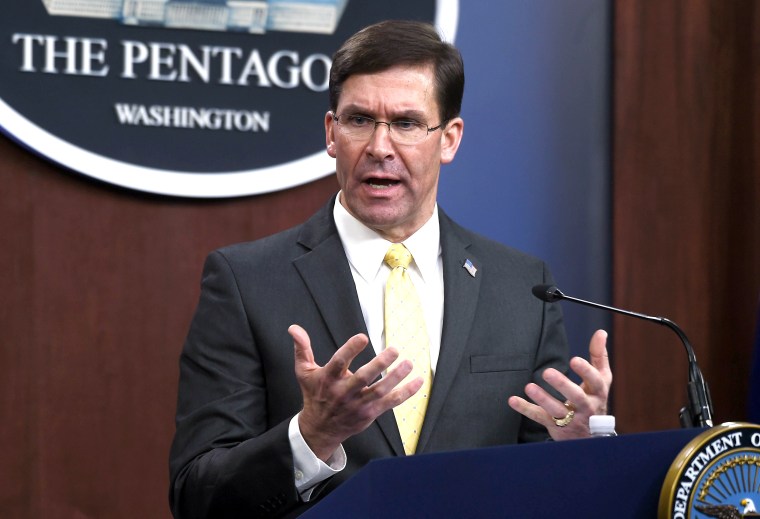Donald Trump hasn't had great success when it comes to secretaries of Defense. His first Pentagon chief, retired Gen. James Mattis, proved to disappoint the president by being responsible, and Mattis eventually came to the conclusion that Trump was worthy of public denunciation.
The president's second choice was Patrick Shanahan, who was forced to exit the stage under difficult personal circumstances.
As we discovered today, Trump's third choice ended in failure, too.
President Donald Trump announced Monday that he fired Mark Esper as his defense secretary and said Christopher Miller would serve as the acting secretary of the Department of Defense.... NBC News has previously reported that Esper has long been at odds with Trump.
Though NBC News reported last week that Esper had already prepared a letter of resignation, the president explicitly added in his tweets that the outgoing DOD leader "has been terminated."
Part of what makes this story such a mess is what led to the strained relationship between Trump and Esper. Over the summer, federal security forces removed peaceful protestors from Lafayette Square, a park across the street from the White House, in one of the ugliest moments of the Republican's presidency. Once the area was cleared by force, the president walked through the park, posed in front of a nearby church, briefly waved a Bible, and immediately created a scandalous photo-op that ricocheted around the world.
It wasn't long before Esper claimed he didn't fully understand what was going on around him, and made clear that he regretted having been part of the ordeal.
The president, true to form, felt betrayed by the Defense secretary's reasonable concerns, and soon after, the Republican started talking openly about Esper's ouster.
Whether Esper learned of his firing via Twitter or via the president is not yet clear.
But making matters worse is the set of broader circumstances. A new administration will take office in 72 days, and there was no reason to believe President-elect Joe Biden planned to keep Esper on as a member of the Democrat's cabinet. In other words, Esper was poised to give up his post in a couple of months anyway.
The question then becomes, why bother?
Did Trump fire the Pentagon chief as an act of political spite against a cabinet secretary who indirectly hurt his feelings? Was there a policy Esper was reluctant to implement during Trump's lame-duck period? Is this intended to make the transition between administrations more difficult?
Former CIA Director John Brennan told NBC News, "I think there is a lot that's going to happen over the next 75 days as Trump carries out vendettas, settles scores and tries to position himself for his next act.... He is a totally unprincipled, unethical individual. I don't think anything is beyond him, and that's very scary to say."
Retired Gen. Barry McCafferty added on MSNBC that the public should be "apprehensive about what's going on," adding, "We ought to be worried about this."
Sen. Chris Murphy (D-Conn.), a member of the Senate Foreign Relations Committee, wrote on Twitter, "Trump is creating a dangerously unstable national security environment during this transition period. Adversaries are watching."

